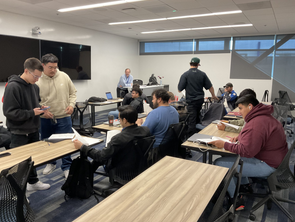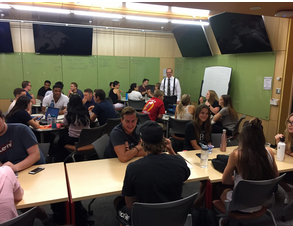Introduction
In the right away evolving international of entrepreneurship, educating startup execution has not ever been greater significant. With the rise of virtual structures and the democratization of commercial enterprise methods, aspiring entrepreneurs have unprecedented get right of entry to to instruments. However, theoretical talents on my own seriously is not adequate. Practical Applications: How to Teach Startup Execution Effectively delves into imaginitive methodologies and genuine-global functions that foster a vibrant finding out atmosphere for future enterprise leaders.
From Textbooks to Transformation: Why Entrepreneurship Teaching Must Go Beyond the Business Plan
The Limitations of Traditional Teaching Methods
Entrepreneurship coaching ordinarilly depends on textbooks that emphasize idea over observe. While expertise foundational suggestions is integral, it hardly ever prepares pupils for the dynamic nature of starting a commercial. Students desire to engage with authentic-international demanding situations in place of simply memorizing records.
Transformative Learning Experiences
To foster transformation, educators could put in force hands-on reports that permit students to apply their getting to know in sensible contexts. This may incorporate case reviews, simulations, or collaborative initiatives that replicate real entrepreneurial endeavors.
Curriculum Integration: Merging Theory and Practice
Integrating useful assignments into the curriculum will domesticate a deeper expertise of entrepreneurship. For illustration, instead of purely outlining a marketing strategy, college students should be tasked with setting up one established on truly industry study and executing it within a given time frame.
Teaching Entrepreneurial Mindset: Cultivating Creativity, Resilience, and Opportunity Recognition
What Is an Entrepreneurial Mindset?
An entrepreneurial frame of mind encompasses creativity, resilience, and the potential to acknowledge opportunities where others will possibly not. It’s about fostering crucial thinking and flexibility—abilities critical for navigating Entrepreneurship Professor nowadays’s elaborate industrial landscape.
Strategies for Cultivating Creativity in Students
- Brainstorming Sessions: Encourage open discussion wherein college students can proportion strategies devoid of judgment. Cross-Disciplinary Projects: Collaborate with varied departments to spark ingenious suggestions. Creative Problem Solving Techniques: Introduce equipment along with design considering or SCAMPER.
Building Resilience Through Challenges
Resilience isn’t just about bouncing lower back from failure; it’s about embracing challenges as expansion opportunities. Incorporating failure-centred discussions into tuition can lend a hand scholars view setbacks as component to their entrepreneurial tour.
Project-Based Learning in Entrepreneurship Education: Turning Classrooms into Real-World Labs
What Is Project-Based Learning (PBL)?
Project-Based Learning (PBL) emphasizes lively learning through engaging initiatives that require principal pondering and collaboration. In entrepreneurship coaching, PBL bridges the distance among thought and practice.
Implementing PBL in Entrepreneurship Classes
Define Real-World Problems: Start by using settling on neighborhood challenges organisations face. Encourage Team Collaboration: Form agencies to foster teamwork and motivate diversified perspectives. Present Solutions: Allow scholars to pitch their rules or merchandise to nearby enterprise leaders or group individuals.Benefits of PBL for Aspiring Entrepreneurs
- Enhances engagement through making learning relevant. Develops comfortable expertise like conversation and teamwork. Provides precious networking possibilities with industry mavens.
Bridging Theory and Practice: How to Teach Business Models, Validation, and Startup Execution
Understanding Business Models
A forged hang of more than a few enterprise items is needed for any entrepreneur. Educators must hide conventional fashions like B2B or B2C when also discussing cutting-edge modifications akin to subscription prone or freemium fashions.
Teaching Validation Techniques
Validation is the task of testing an inspiration before launching a full-fledged services or products:
Customer Interviews: Have scholars conduct interviews with workable clients to gather insights. Prototyping: Encourage short iterations with the aid of low-fidelity prototypes that could be examined in factual settings. Feedback Loops: Create mechanisms for ongoing criticism from clients after release.Startup Execution Strategies
Effective startup execution calls for strategic making plans and agile methodologies:
- Implement Lean Startup ideas focusing on iterative development. Teach time leadership tactics principal for balancing diverse tasks for the time of startup stages. Foster an expertise of metrics that depend—assistance students title key efficiency signals (KPIs) principal to their ventures.
Assessment That Matters: Measuring Entrepreneurial Competency, Not Just Course Completion
Rethinking Assessment Methods in Entrepreneurship Education
Traditional comparison programs traditionally center of attention fully on grades other than skills required by using marketers. It’s standard for educators Startup Mentor Tucson Arizona to reconsider how they evaluation student overall performance situated on proper-international program rather then rote memorization.
Competency-Based Assessment Strategies
Portfolio Development: Encourage college students to create complete portfolios showcasing their work all over the path. Peer Reviews: Implement peer assessments that let pupils to give optimistic feedback on each one other's tasks. Real-Life Simulations: Use simulations in which scholar efficiency can be evaluated depending on resolution-making approaches lower than power.The Future of Teaching Entrepreneurship: AI, Experiential Learning, and Global Innovation Hubs
The Role of AI in Entrepreneurship Education
Artificial Intelligence (AI) gives one-of-a-kind instruments for boosting entrepreneurship instruction:
Personalized Learning Paths: AI can tailor instructional content material based on character student demands and preferences. Market Analysis Tools: Leverage AI-driven analytics resources enabling college students to analyze industry trends effectively. Virtual Mentorship Platforms: Connect aspiring marketers with mentors globally as a result of AI-powered matchmaking algorithms.Experiential Learning Opportunities Beyond the Classroom
Experiential learning comes to gaining talents by way of knowledge:
- Encourage internships with startups or generic organisations. Promote participation in hackathons or entrepreneurial competitions in which useful competencies would be honed.
Global Innovation Hubs
Local innovation hubs are emerging everywhere—these spaces offer supplies similar to mentorship opportunities, networking hobbies, funding assets like challenge capitalists, and co-running environments conducive to collaboration amongst entrepreneurs.
FAQs
Q1: What are the leading techniques to teach entrepreneurship correctly?
A combination of undertaking-situated gaining knowledge of, experiential occasions, mentorship applications, and incorporating true-global problems into training maximizes engagement.
Q2: How do I examine my college students’ entrepreneurial advantage?
Use competency-based totally assessments together with portfolios showcasing tasks achieved for the duration of your path in preference to relying only on exams.


Q3: What function does creativity play in entrepreneurship?
Creativity fosters innovation—the capacity to consider outdoors the box is important whilst solving trouble or constructing new merchandise.
Q4: Why is resilience beneficial for marketers?
Resilience enables entrepreneurs to navigate screw ups definitely even as preserving motivation toward attaining long-term goals.
Q5: Can science decorate entrepreneurship coaching?
Absolutely! Tools like on line simulations can replicate true-life situations when AI assists in personalizing educational reviews.
Q6: How do global innovation hubs gain aspiring entrepreneurs?
They grant significant components which includes mentorship connections along collaborative environments conducive for brainstorming thoughts.
Conclusion
In conclusion, instructing startup execution well calls for a shift from average approaches in the direction of experiential discovering strategies built-in with contemporary applied sciences like AI. By focusing not in basic terms on theoretical thoughts yet also purposeful programs—which includes challenge-based totally discovering techniques—we put together destiny entrepreneurs more suitable equipped for fulfillment in an ever-evolving market. The emphasis need to shift in opposition to cultivating an entrepreneurial approach characterised by using creativity, resilience and probability consciousness for sustainable increase inside this dynamic container!
This article gives accomplished insights into reasonable applications wanted when teaching startup execution efficiently—equipping educators with treasured frameworks even as inspiring aspiring marketers along their targeted trips!